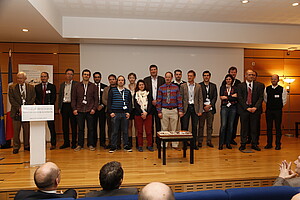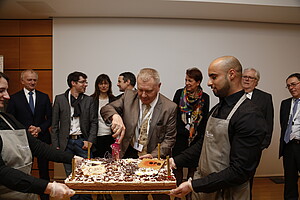Among more than 100 events all over Europe, it is in Strasbourg, city 'cross-border and humanist' that the European Council of Research (ERC) has chosen to celebrate its tenth anniversary, this Wednesday, 15 March. Carlos Moedas, Jean-Pierre Bourguignon and Thierry Mandon made the trip to show their commitment to a European research and pay tribute to the Alsatian site's 45 ERC winners. A national event to take stock, talk about the future and discover the diversity of the projects. Feedback on the discussions during this exceptional day which was held at the Isis.
Summary
Focus on the morning's discussions
"Ten years is a special birthday, let's celebrate!", began Michel Deneken in his inaugural speech. The president of the University of Strasbourg was "happy and proud" to celebrate this "ambitious and generous" Europe, thumbing his nose at the notion of "flattering europhobia". The tone was set.
All the speeches are in tune to affirm that the future of Europe is inseparably linked to that of scientific research. "Science is supranational and as such, it makes us go beyond borders", assures Michel Deneken. "It is precisely by going beyond the borders, by sharing intelligence between us, that we build our European identity."
"Wagering on intelligence and audacity."
At the time of the balance sheets, the ERC program appears to be a formidable instrument to encourage an open science, both fundamental and innovative. "We are here to celebrate a European success, perhaps the greatest," says Carlos Moedas, European Commissioner for research, innovation and science. He recalled as well that within 10 years, six ERC laureates have received the Nobel Prize. Funded research also helped the publication of more than 5,000 major articles in the most prestigious scientific journals. "Europe has overtaken the United States," he said while regretting that Europeans do not really vaunt their authentic scientific and innovative capacities. Speaking to the ERC laureates, he encouraged them: "you have an ability to excite us about things that we don't necessarily understand. You are the best ambassadors for science, but you can also be the best ambassadors for Europe. It must be said loud and clear that we are proud of European research."
Upcoming negotiations
The prize is a great one. The debates on the future of Europe will be fierce and budgets - including for research - are not set in stone. "The research budget represents 8% of the European budget," said Jean-Pierre Bourguignon, president of the European Research Council. We push for that this budget to be more consequential, but from 2021, nobody really knows where we're going. All call upon the courage of policies and the mobilisation of researchers: "the ERC program should remain a top priority for the future."
Focus on discussions in the afternoon
"For the first time, they give me a true mark of confidence. I have flexibility, a capacity for action. I don't need to justify every penny at every moment." Christian Bonah, winner of an ERC Advanced Grant scholarship in 2016, sees a real opportunity in the European Research Council. "Being able to work on a project for five years is a huge privilege in human and social sciences."
The other ERC winners, accompanying him at this round table also shared this feeling. "It's international recognition for our research" added Hélène Puccio, winner of an ERC Starting Grant in 2007. For the franco-Norwegian researcher Thomas Ebbesen, this European initiative offers a wide freedom, an essential ingredient to push back the frontiers of science. "I was able to develop exploratory projects which, today, are opening new avenues of research."
Perseverance
Once obtained, the ERC grant imposes few administrative constraints on the recipients. However, the drastic selection rate may dissuade some from trying their luck. "You may file a fantastic project and fail to be awarded an ERC scholarship on the first attempt. There was my experience. However, you should not be discouraged, but keep trying." It was the winner of the prestigious Kavli award saying this. "It's above all the originality and excellence of the project that are at the heart of the evaluation", according to Thomas Ebbesen.
The winners, gathered to share their experiences, encourage their young colleagues to submit projects to the ERC. For Hélène Puccio, it is even more than that. "We must train our doctoral and masters students to write up projects, to defend their ideas." The challenge: to give them weapons that will allow them to thrive in a climate of research that has become very competitive.
Political weapon
At the conclusion of this anniversary day, Alain Beretz, former president of the University of Strasbourg, now CEO of innovation and research, emphasised "a before and an after ERC" and insisted: "the ERC is a model that must be exploited. Its demanding nature, simplicity, dynamism should inspire us all [...] It is a political weapon that must be used." The same message from Michel Deneken, who took the opportunity to remind us that we must "continue to ensure tools of excellence for beginners and experts alike."
Ronan Rousseau

















